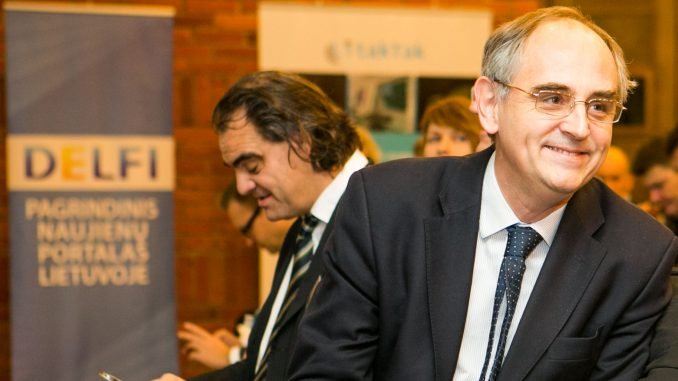
No regular visitor to the Snow Meeting would be surprised by the dreadful events of 2014, least of all the Lithuanians. I am still waiting for a senior Westerner to admit that the east Europeans – for so long patronised and belittled when they warned about Russia in previous years – were right.
Had we worried rather more about Russian corruption and imperialism earlier, we would not now be scrambling to cope with the dismemberment of Ukraine, and the destruction of the European security order.
One of the big arguments at this year’s meeting was about sanctions. The paradox is that sanctions will not change Russia for the better, but they are still necessary. They may act as a deterrent, and they are at a minimum an expression of willpower and solidarity. Without sanctions, our response to the dismemberment of the European security order would be a shrug and a press release. But sanctions are not a substitute for policy. My own preference would be for a much tougher stance on Russian dirty money in the West – including prosecuting the lawyers, accountants and bankers who were the accomplices in the theft of many tens of billions of dollars from the Russian people.
The second day of the Snow meeting was public: a joint session with a shindig for Russian intellectuals organised (again splendidly) by the Lithuanians. A spectacular clash between the Washington-based economist Andrei Illarionov and the exiled oligarch Mikhail Khodorkovsky was a particular highlight. Mr Khodorkovsky (although robbed and jailed by the regime) seemed remarkably conciliatory, saying that sanctions were counterproductive and hinting that he would be ready to play a role in a future transitional government.
Mr Illarionov, who used to advise Mr Putin and is now one of his foremost detractors, was blisteringly critical of that and of Mr Khodorkovsky’s refusal to state firmly that Russia should give Crimea back to Ukraine. Mikhail Kasyanov, a former Putin prime minister who is also now a leading opposition figure, took a different tack. Russia’s only hope is to become a modern European country, he said. That precludes annexing neighbours’ territory.
I enjoyed the public clash between Mikhail Khodorkovsky and Mr Putin’s former adviser Andrei Illarionov. But I found it depressing. It reminded me a bit about the furious spats I used to witness among émigré anti-communists during the cold war. Mr Putin has successfully marginalised the opposition, and their disputes about tactics, strategy and principles are like bald men squabbling about combs. I was delighted to see that the Snow Meeting coincided with the meeting of Russian intellectuals – but I hankered to hear more of the discussion of ideas.
More private discussions revolved around the right response to Russia’s “hybrid” or “ambiguous” warfare. The fundamental principle of this is that it is a tussle of wills. What matters is not who loses most, but who most minds losing.
On this front my impression is that quite a lot is going on behind the scenes at all levels. I heard a new (to me, and I suspect to most people) bit of jargon – Nato Force Integration Units (NFIU). These are apparently going to be a centre-piece of alliance efforts in 2015. These will be mobile, rapidly deployable, multinational forces involving both US and European forces.
That is just part of a picture of activity involving EU, NATO, and national governments sometimes working together and sometimes on their own. It is a great deal better than the stagnation and timidity of a few years ago. The paradox is that talking about it publicly is a kind of taboo. Presumably our defence planning is not secret from the Russians (not just because they have excellent spies, but presumably it is part of our deterrent for them to know we are serious). But oddly, we do have to keep what we are doing away from some of our own politicians.
—-
Edward Lucas is a senior vice-president at the Center for European Policy Analysis. He also writes for The Economist.
The Snow Meeting was organized by the Ministry of Foreign Affairs of Lithuania and Vilnius Intellectuals Forum was organized by Eastern Europe Studies Centre together with the MFA on 15-16 January. Almost 70 participants attended the Forum, including Mikhail Kasyanov, former Russian prime minister, Russian academics and researchers, such as Lilia Shevtsova, Andrey Piontkovski, Andrey Illarionov, Andrei Zubov, journalists and public figures.
The Snow Meeting was attended by Urban Ahlin, the Speaker of the Swedish Riksdag, Edgars Rinkēvičs, Foreign Minister of Latvia, Keit Pentus-Rosimannus, Foreign Minister of Estonia, and Miroslav Lajčák, Foreign Minister of Slovakia, as well as representatives of the U.S. Department of State and the administration of the President, NATO Deputy Secretary General, officials of the EU and NATO member states.

Be the first to comment